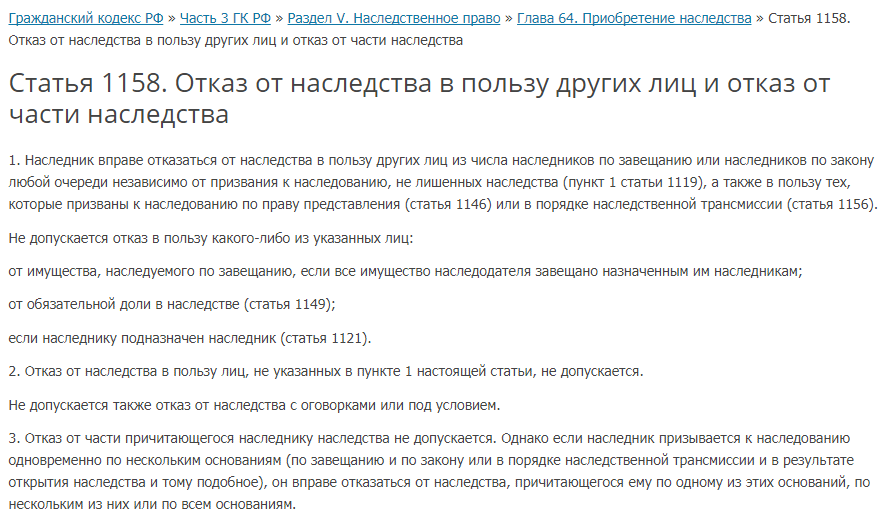Concept and types of refusal of inheritance
Content
Inheritance occurs on the basis of a will or legal order. Regardless of the method of transfer of material assets, the acceptance of property can only be voluntary. This means that the heir has the right to find out a list of values and debts, and then decide on the advisability of accepting them.
In practice, the voluntariness of the acquisition of property is confirmed by a handwritten statement from the heir. Lack of treatment is regarded as unwillingness to accept property after the death of the testator.
Refusal of inheritance is a statement requesting that a candidate be excluded from the number of heirs. In this case, it is not necessary to indicate the reason, but the person must be familiar with the consequences upon signature.
An official refusal can be prepared by:
- persons specified in the will;
- relatives claiming to acquire property in the order of legal priority.
In case of refusal of a share due to a minor heir, a representative of the guardianship authorities must participate. He must confirm that the interests of the child are not violated.
In case of refusal of property by all possible heirs, the property acquires the status of escheat and passes to the state.
In total, the law provides for 2 ways of accepting inherited benefits:
- unconditional;
- in favor of a specific person.
Refusal of inheritance in favor of another heir
When renouncing his share of property, a citizen has the right to indicate to whom he wants to transfer this part of the property. In this case, the following rules must be followed:
- the application immediately indicates the potential recipient;
- the application must be registered with a notary, after which it cannot be canceled;
- only another relative or person specified in the will can be noted in the appeal;
- It is unacceptable to transfer property to a person recognized as an unworthy candidate or excluded from the list of recipients by the testator himself.
The legal successor in whose name the application is made is not obliged to accept the inheritance. He may renounce it by specifying a specific successor or unconditionally.
An example of refusal of inheritance in favor of another heir:
Before his death, citizen O. executed a will in order to transfer the only housing - a three-room apartment - to his wife, daughter and grandson.
After the opening of the inheritance, the wife renounced her claims to the property, drawing up a waiver in favor of her grandson. The daughter did not want to accept the apartment due to remote residence and drew up a written refusal with a request to transfer the property to her son (grandson of the deceased testator). The notary registered the application and drew up an inheritance certificate in the name of the grandson of the deceased testator.
Unconditional renunciation of inheritance
In this option, the candidate for inheritance simply draws up a statement stating his reluctance to accept the inheritance. Specifying the reason for refusal is optional.
The most common reasons for abandoning inherited property:
- support of property with debt obligations, the amount of which fully covers or exceeds the potential profit;
- the high cost of acquiring an inheritance (the successful heir pays a state fee in the amount of 0.3% of the total price of the property);
- remote residence from inheritance;
- poor condition of the inherited property.
The reasons may be psychological, related to the reluctance to communicate with other potential recipients of values. The notary cannot refuse to accept an application from the heir.
How to refuse inheritance under a will in favor of another person?
In order to do this, it is necessary to submit a special application for renunciation of inheritance to a notary within six months from the date of death of the testator. In this application, you must indicate that you are refusing in favor of a specific person, indicate this person, his last name, first name, patronymic, date of birth and all passport details.
Article 1157 of the Civil Code of the Russian Federation. Right to refuse inheritance
The law allows for the possibility of renouncing an inheritance in favor of another person through a representative. To do this, the representative must issue a power of attorney, which must be notarized. This power of attorney must include the right of the representative to refuse inheritance under a will. It is better to specify in it and in whose favor such a refusal should be carried out.
You can also send an application to a notary by mail. But in this case, the signature on such a statement must also be certified by a notary. In addition to the notary, the signature on such a statement can be certified by the person to whom such a right is given by law.
For example, if there is no notary in a certain area, their functions can be performed by specially authorized officials in local government bodies.

Article 1159 of the Civil Code of the Russian Federation. Ways to refuse inheritance
Officials of consular posts located in foreign countries can also perform such functions. For example, if you find yourself abroad for work or service and you need to send such an application to Russia, then you can contact the Russian consulate, where they will verify your signature on the application.
Also, the signature on such an application sent by mail or transmitted with another person can be certified:
- the organization in which the person refusing the inheritance works (signature of the manager with the organization’s seal attached);
- the organization in which the person refusing the inheritance studies (signature of the head with the seal of the organization attached);
- by the administration of the inpatient medical institution where the person refusing the inheritance is studying (signed by the head physician with the seal of the institution attached).
Forms of refusal of inheritance
Regardless of the reasons, the procedure has a number of significant features:
- property can be abandoned only after the death of the testator;
- a person renouncing property must claim the valuables in accordance with the legal order or on the basis of a will;
- the refusal is a handwritten statement;
- The decision to relinquish property cannot be reversed.
The notary is obliged to familiarize the participants with the consequences of making a decision to refuse inheritance.
Full or partial renunciation of inheritance
The Civil Code establishes that acceptance or refusal is permissible only for the entire due share of the inheritance. Therefore, the notary announces to potential heirs a list of material assets and accompanying debt obligations.
Before the expiration of the inheritance period (6 months), candidates can draw up a settlement agreement, determining the order of division of values. When inheriting according to the law, the benefits will be divided equally. If the transfer of property is carried out on the basis of a will, then in different parts.
Refusal of part of material assets is not allowed. It is impossible to refuse only debts while receiving benefits.
However, the heir may refuse inheritance on one of the grounds, but accept the property on another. For example, renounce inheritance by will and accept your share by law.
Refusal of inheritance with condition
Fixing conditions at the stage of inheritance is unacceptable.
The only available condition is the transfer of property to a specific applicant from among the potential heirs.
What do you need to know before refusing an inheritance?
Before taking such a serious step as refusing an inheritance, you need to understand what legal consequences this will entail:
- It is impossible to “change your mind” and withdraw your application. It is not possible to cancel a refusal.
- If an application for entry into an inheritance was previously submitted (or an actual entry into an inheritance occurred), you can submit an application for refusal (see “Refusal of an inheritance after its acceptance”).
- An incapacitated or partially capable person cannot refuse to inherit without the permission of the guardianship and trusteeship authority.
Expert opinion
Dmitry Nosikov
Lawyer. Specialization: family and housing law.
This means that before the legal representative (parent, guardian, custodian) of young children or persons suffering from physical or mental illness, due to which they are unable to make decisions and perform legally significant actions, submits a waiver, permission from the state body (guardianship and guardianship authority) is required. guardianship). Permission will be given if the refusal to inherit does not contradict the rights of incapacitated and partially capable heirs (see “Can a minor refuse an inheritance”).
- It is impossible to refuse only part of the inheritance. For example, inherit property, but refuse debts.
- Cannot refuse with reservations. For example, “if it turns out that the testator has debts, I refuse. If there are no debts, I join.”
- It is permissible to renounce both all and part of the inherited property inherited on various grounds. For example, you can enter into an inheritance under a will and refuse to inherit that part of the property that is not taken into account in the will and is inherited by law. Or take over your rights both by law and by will. Or refuse inheritance on both grounds.
- Refusal of inheritance under a will is possible only in favor of designated heirs.
- An heir to whom the right of inheritance has been transferred due to the refusal of another heir also has the right to refuse it.
Many people are put off by the cost of abandoning an inheritance. Indeed, a notary charges a certain amount for his services. Usually it is 100 rubles - for certifying the signature of the refusenik on the application form (clause 21, clause 1, article 333.24 of the Tax Code of the Russian Federation). In addition, you will have to pay for legal and technical services (LPTH). For example, in Moscow, notaries charge 1,000 rubles . Read more about prices in the article “How much does it cost to refuse an inheritance from a notary?”
Procedure for registering a refusal of inheritance
The following options for filing a waiver application are permitted by law:
- personal appeal to a notary in order to terminate your claims to property;
- involving in the procedure a representative acting on the basis of a notarized power of attorney, which is advisable when the heir lives in another city (the power of attorney contains a list of entrusted powers and their validity period);
- carrying out the procedure through a representative of the guardianship authorities, whose participation is mandatory when involving a minor heir in the procedure;
- sending documents by mail (the refusal application and a copy of the passport are certified by a notary at the place of residence, and then sent by registered mail to the notary who opened the inheritance proceedings).
Refusal procedure:
- contacting a notary;
- familiarization with the consequences of the decision made;
- drawing up an application;
- registration of appeal;
- implementation of the decision, that is, the loss of legal claims to property.
Form and content of the application
There is no strict application form. As a rule, each notary has an application form, which must contain the following sections of information:
- the name of the notary who is considering the inheritance proceedings;
- name of the document (renunciation of inheritance);
- Full name of the heir;
- the applicant's residential address;
- personal information of the deceased testator;
- relationship between the testator and the heir;
- date of death of the testator;
- on what basis does a person claim ownership;
- clarification of to whom inheritance rights are transferred (this is an optional condition);
- date and signature of the applicant.
When submitting an application, the notary, against signature, acquaints the potential heir with the consequences of signing such an application. This document confirms that the person fully knew and understood what the renunciation of property entails.
Required documents
To complete the refusal procedure, it is enough to confirm the application with a personal identification document. The notary keeps a copy of the passport. The applicant himself does not receive notice of his exclusion from the list of heirs.
If the refusal is issued at the stage of opening the inheritance, the following documents must additionally be supported with the application:
- death certificate of a person;
- a will, if an administrative document was drawn up;
- list of persons applying for inheritance;
- a list of property that can be inherited;
- assessment of an object passed on by inheritance;
- a document confirming the relationship with the deceased testator.
Depending on the circumstances, additional documents may be required:
- power of attorney for representation of interests;
- permission from the guardianship authorities to waive a share of the inheritance of a minor recipient.
Cost of failure
There is no state fee for participation in the refusal procedure, so the costs depend on the cost of notary services.
In some notary offices everything will be completely free. On average across the country, the procedure will cost 300 rubles.
Deadlines for renunciation of inheritance
The time limit for sending an application to relinquish property is strictly limited. It will be possible to prepare an application only after the death of the testator, regardless of whether an inheritance case has been opened or not. It is enough for a person to bring a death certificate confirming the grounds for acquiring the inherited property.
The maximum date for sending a refusal is 6 months allotted for inheritance. After this, it is considered that the citizen did not exercise the right to acquire an inheritance, which indicates his reluctance to receive property.
In favor of whom can one waive an inheritance under a will?
This can only be done in favor of other heirs by will or by law. In favor of some strangers who would not inherit under any circumstances - neither by law nor by will, it is impossible to refuse the inheritance.

Article 1158 of the Civil Code of the Russian Federation. Refusal of inheritance in favor of other persons and renunciation of part of the inheritance
It is also impossible to refuse in favor of the heir who was deprived of the inheritance. The point here is the presumption of the will of the deceased. This will has priority, and if by his order he specifically deprived someone of an inheritance, then no one has the right to change this will.
If for some reason you consider this procedure to be unfair, then no one is stopping you from accepting the property and then transferring it to whomever you personally deem necessary. But the law does not allow you to refuse in favor of the one whom the testator deprived of property.
Refusal of inheritance after 6 months
The desire to receive an inheritance is confirmed by a handwritten statement. The Civil Code states that those wishing to receive property must prepare an application within a maximum of six months from the date of death of the testator. After submitting such an application, the heir has the legal right to familiarize himself with the list of abandoned valuables.
After this, before the end of the six-month period, you can formalize the abandonment of the property. After six months, it will be possible to cancel the acceptance of material assets only through the court by filing a statement of claim.
Grounds for appealing the acquisition of inheritance:
- obtaining previously unknown information about debt obligations;
- coercion to receive an inheritance;
- acquisition of property under the influence of deception.
Choice of court
The consideration of the petition is carried out by a federal court of general jurisdiction located in the region where the inheritance property is located or in the area where the inheritance proceedings were opened.
Statement of claim
The application is prepared in writing, briefly outlining the essential points, in Russian, without errors, omissions, or corrections.
List of documents
Lawyers advise supporting every word of the statement of claim with evidence. And the more documents, the higher the chances of successfully protecting personal interests.
Required documents:
- applicant's passport;
- notarized certificate of acceptance of inheritance;
- a document confirming the violation that is the basis for canceling the claim;
- explanations of witnesses;
- financial documents showing costs;
- receipt of payment of state duty.
In 2020, the cost of filing an application with the court is 300 rubles.
Statute of limitations
The Civil Code provides for a limitation period of 3 years. This time begins to count from the moment when the citizen learned or could find out about the violation of his rights.
Review of the application and completion of the process
The consideration of the application takes place in several court hearings, the number of which depends on the severity of the dispute.
The first meeting must be scheduled a maximum of one month from the date of receipt of the application of the interested citizen. After receiving a court verdict, the plaintiff has the right to appeal the decision within a month.
If the document enters into legal force and the claim is satisfied, the notary is obliged to resume enforcement proceedings and carry out the inheritance procedure again. If a person has previously paid the state duty for the property received, then it will be returned to him by the future heir who agrees to accept the valuables.
Alternative options for refusing inheritance
Often, reluctance to accept and reluctance to use property are related to each other. But the recipient does not have to guarantee the further intended use of the inheritance. You can prepare an administrative document on the basis of which the valuables will be transferred to other relatives or third parties.
A testator who wishes to transfer valuables to a specific person can draw up an administrative document during his lifetime guaranteeing that the property will be transferred to the specified person.
Conclusion of a gift agreement
A deed of gift is a voluntary bilateral agreement drawn up between the owner of the property and the recipient of the property. The agreement is approved by a notary, is subject to registration, and enters into legal force upon signing.
This means that the recipient immediately becomes the owner of the property, but it is permissible to include in the contract a mention that the testator has the right to live in the apartment until his death.
Making a will
A will is an order by which the testator strictly determines the list of heirs and the size of the received share of each of them. It does not guarantee that a person will not give up his part of the property.
Refusal to accept inheritance
To avoid accepting inherited property, it is enough not to contact a notary for 6 months from the date of death of the testator. If a potential heir does not fill out a statement of desire to receive the property, it is considered that he did not want to purchase the property.
In this case, the heir has a chance to restore the lost period and receive property after the death of the testator. If you refuse, you will not be able to reverse your decision.








